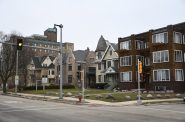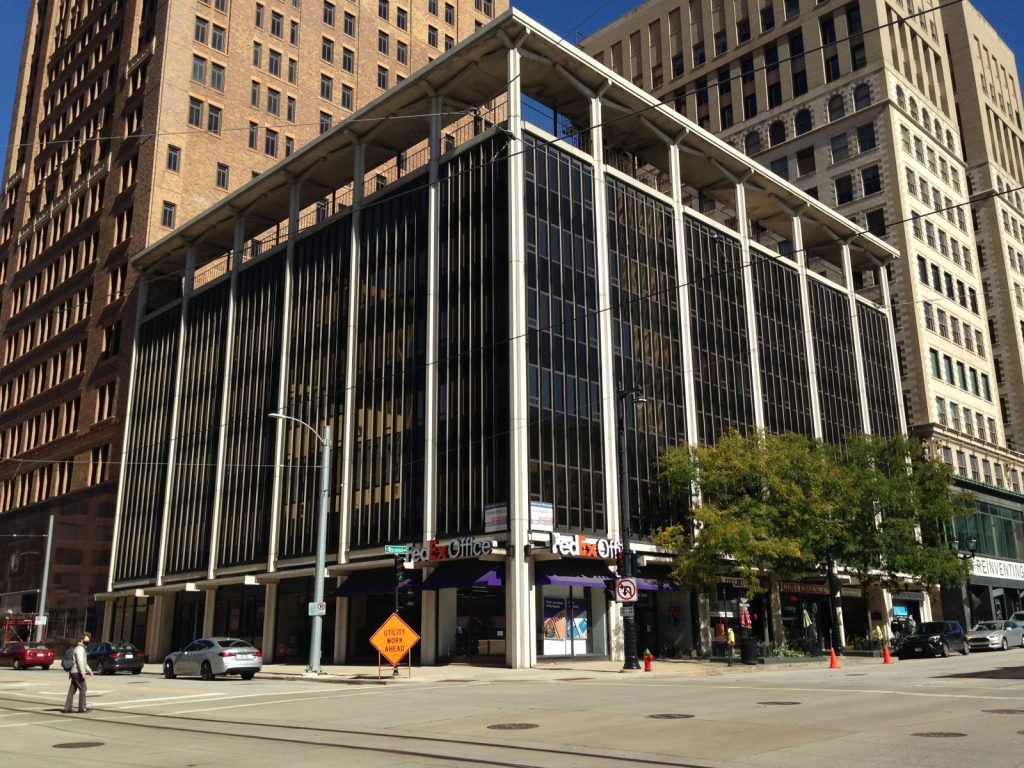Residential Treatment Center Opens Downtown
48-bed eating disorder facility in a 7-story building. Plus: All the week's real estate news.
California-based Discovery Behavorial Health Inc. announced this week that it opened an eating disorder treatment center in a downtown Milwaukee office building.
The 48-bed facility is located in the seven-story building at 312 E. Wisconsin Ave. Spread over four floors, the 48-bed facility provides residential, partial hospitalization and intensive outpatient care.
“Eating disorders are a specific type of behavioral health disorder that require specialized clinical interventions. Today… with the demand for mental health that has continued to surge since the pandemic, we are committed to being good partners in the community by building relationships with patients and their families as well as fellow healthcare professionals. We are eager to support and work with the people in this region, throughout Wisconsin and surrounding states,” said Vogt in a statement.
The organization, in a press release announcing the new location, touted its proximity to a number of colleges and universities as well as its transit accessibility. Its website says the facility is accessible from the airport, welcomes patients from nearby states, and is currently an adults-only operation with plans to service adolescents.
“Behavioral Health is helping to fill Wisconsin’s significant need for mental health services. Our state has 859,000 adults with a mental health condition – many of them without good treatment options,” said Senator LaTonya Johnson (D-Milwaukee) in the press release.
“I’d like to thank Governor Tony Evers, his staff and the people at Wisconsin Department of Health Services for their guidance as this service was established,” said Discovery CEO John Peloquin. The business, which dates back to 1985, operates more than 154 treatment centers for a variety of conditions. The Milwaukee facility is the first in Wisconsin, but three facilities are located in the Chicago area.
Current first-floor tenants include a FedEx Office store, Convenience+, the Christian Science Reading Room and P’Dia Tailoring & Alterations.
The building was constructed in 1926, but substantially remodeled in the 1960s by Irvin and Shelby Lozoff. The father-son team cited their success recladding 622 N. Water St., now referred to as the Ladybug Building, as the inspiration for stripping what today would be regarded as an architecturally-significant building. Known as the Wisconsin Broadway Building, the Lozoffs didn’t rename the structure as part of their $850,000 project, despite the fact the building then located across the street was known as the Broadway Wisconsin Building (confusion over the two in 1961 led the Milwaukee Journal to publish a sarcastic correction). Another curious Lozoff architectural choice, concrete sunshades on an eastside building, is being removed as part of an ongoing redevelopment effort.
Weekly Recap
Supervisors Approve Affordable Housing Plans
A Milwaukee County Board committee provided key approvals that will allow county administrators to move forward with two major affordable housing projects.
One project is aimed at building more than 100 affordable homes in the King Park neighborhood that will eventually be sold to first-time homebuyers in the majority Black neighborhood. The second project will invest more than $2 million into a fund purchasing houses to keep them out of the hands of out-of-state investors gobbling up Milwaukee’s housing supply.
County Executive David Crowley and the Department of Health and Human Services (DHHS) advanced a number of affordable housing initiatives in 2022; most have been made possible by the federal American Rescue Plan Act (ARPA) stimulus funds the county received. Crowley implemented the government’s first strategic plan in 2020, creating an overarching mission for all county departments to make Milwaukee the healthiest county in Wisconsin by achieving racial equity. Stable housing is an integral piece of this equation for the county executive.
“The foundation of housing is one of the main social determinants of health, and there still remains a large gap as relates to homeownership for African-Americans throughout Milwaukee,” County Executive David Crowley said in July when he signed a spending resolution with funding for affordable housing projects in suburban communities.
New Gym Rises at 76th and Good Hope
A new Planet Fitness gym is nearly ready to open at W. Good Hope Rd. and N. 76th St.
An online presale for memberships is underway while a construction crew from James Construction works to complete the 20,948-square-foot building. Membership starts at $10 per month, while a construction permit says the building cost at least $2.5 million.
Franchisee Black Duck Partners (BDP) secured approval earlier this year to develop the gym at the site of what was once a Home Dept garden center.
BDP needed a zoning change because the city created a special zoning district for the home improvement store in 2004, only for it to close in 2008. Home Depot was shortly thereafter replaced by a Pick ‘n Save grocery store, but the garden center site was left vacant.
Investment Advisor Group Leasing Space At BMO Tower
Irgens landed a new tenant for a half-floor space near the top of BMO Tower.
Silvercrest Asset Management Group is leasing 11,194 square feet on the 22nd floor of the 25-story office tower, 790 N. Water St.
“Silvercrest professionals deserve a high-end office environment that recognizes their talent and enhances the culture of our firm,” said Silvercrest CEO Richard Hough in a statement. Our partners enjoy working together in a collaborative and entrepreneurial environment to deliver the best possible advice to our clients. This played an integral part in Silvercrest’s choosing to locate at BMO Tower,”
“We have found a common thread from many of the occupiers at BMO Tower that the combination of aesthetics, stature, views, technology and amenities have provided their ability to attract work force and their experience has exceeded their expectations,” said Irgens vice president Alyssa Geisler.
City Advancing New Harbor District Apartments With Brandon Rule
The Department of City Development (DCD) is helping developer Brandon Rule move forward on a new mixed-income apartment building at Freshwater Plaza.
It’s part of an attempt to develop more affordable housing, especially in areas seeing substantial new market-rate housing and the potential for displacement. “It’s why we’re especially happy to bring this proposal forward to the commission,” said planning manager Sam Leichtling to the City Plan Commission on Monday.
Rule is pursuing an approximately 140-unit building on a vacant site on the border of the Harbor District and Walker’s Point. It would be immediately east of another mixed-income building, the Freshwater Plaza Apartments, but in a neighborhood seeing substantial market-rate development.
Following a request-for-proposals process earlier this year, the city announced in October it would sell a 2.03-acre site, 200 E. Greenfield Ave., to Rule Enterprises. But before doing so, DCD is seeking to amend a specialized zoning package for the complex to explicitly approve a larger apartment building and reduce a requirement for retail space.
First “Affordable Forever” House Available From Community Land Trust
The Milwaukee Community Land Trust (MCLT) unveiled its first “affordable forever” renovated home Thursday morning, but it won’t be the last.
“We want to have 50 homes in the land trust by 2025,” said executive director Lamont Davis in a press conference outside the first house, 2025 S. 25th St. The group already has public grant funding for 24 more. It still needs to raise additional private funding to complete each of the houses.
The model is intended to provide quality housing to low-income families at an affordable rate that allows for wealth accumulation. VIA CDC, through its award-winning Turnkey Renovation program, is partnering with MCLT on the first five homes.
“VIA’s mission is to be a partner in building strong, healthy neighborhoods where all of us can thrive,” said VIA CDC executive director JoAnna Bautch. “This home is a product of those values.” The three-bedroom, three-bathroom house in the Muskego Way neighborhood was completely renovated with a new roof, appliances, windows and fixtures.
Kaufmann Won’t Build In Historic District
Developer Juli Kaufmann and partner Mike Maschek were supposed to appear before the Historic Preservation for a third time, to win its approval for a new home in the North Point Historic District. They wanted to build a new two-story, 2,997-square-foot house on the 2400 block of N. Terrace Ave.
The commission had twice delayed approval, with chair Patti Keating Kahn warning her colleagues that they were giving conflicting and subjective guidance. The couple, with architect Patrick Jones of Ramsey Jones Architects, was scheduled to return Monday, but instead requested their application be terminated.
They’d had enough. “We concluded we were unwilling to continue participating in the HPC process,” Kaufmann told Urban Milwaukee.
Historic Commission Rejects Mitchell Street Demolition
City of Milwaukee officials are at odds over whether to allow the demolition of a historically-protected structure in order to facilitate the potential development of an affordable apartment building on W. Historic Mitchell St.
On Monday, the Historic Preservation Commission narrowly denied first-time developer Zuwena Cotton‘s request to demolish the two-story building at 1101-1113 W. Historic Mitchell St., but the Common Council could overrule the commission. And based on recent history and the opinions of two key members, it appears such a decision is likely.
Council President Jose G. Perez, the area’s alderman, is supporting the project, and in a surprising development, so is the council’s leading preservation advocate, Robert Bauman.
Cotton purchased the Art Deco-style building in September 2020 for $350,000. “I got it at a really good price,” she told the commission. The structure dates back to 1895 and was long a home for The Grand department store. She said her initial plan was to redevelop it as a mixed-use structure with housing on the upper floor. “Because of the layout of the building, that’s something that’s just not possible.”
Council Members, DCD and Citizens Panel At Odds Over Affordable Housing
The record infusion of money into a 16-year-old affordable housing program is causing unexpected issues at City Hall.
“For the first time in history the Housing Trust Fund is dealing with real money,” said Alderman Robert Bauman on Tuesday to the Zoning, Neighborhoods & Development Committee, referring to federal pandemic funding to the city that can be used for affordable housing. “And as a result there are real issues that have come up that didn’t come up in the past.”
A citizen-led technical review committee for the Housing Trust Fund recommended using a $10 million infusion to partially fund a number of affordable housing proposals. However, the projects they selected left out three that the Department of City Development has plans for: DCD has created tax incremental financing (TIF) subsidies for the three projects with the assumption they would also get a grant from the Housing Trust Fund.
The Common Council now finds itself with a mess, with perhaps too many projects to fund. There are a series of DCD-backed projects that developers say now aren’t ready for construction, a handful of Housing Trust Fund-backed projects that officials with the fund’s administrator, the city’s Community Development Grants Administration (CGDA), warned will lose their largest funding source at the end of the year if the trust fund isn’t used to plug a funding gap and yet another batch of Housing Trust Fund projects that still need to secure an additional funding source even if they get the trust funds.
New Designs For Key Downtown Sites Revealed
The Department of City Development (DCD) and its partners have big plans for at least three key locations Downtown as part of the “Connec+ing MKE 2040” downtown plan update.
The visions, released before an open house meeting, include adding bus-only lanes and protected bicycle lanes to Water Street, upgrading Cathedral Square Park with a pavilion building, permanent stage and water feature and upgrading W. Kilbourn Ave. by adding trees, removing a travel lane and upgrading the protected bike lanes.
DCD also has seven “big ideas” that are intended to summarize the planning effort so far: doubling Downtown’s residential population, making streets more friendly for walking, biking and transit, investing in parks and public spaces, creating and connecting vibrant places, repairing the urban fabric with infill development, connecting the city to water and connecting Downtown to surrounding neighborhoods.
The concepts are intended to generate conversation as DCD, Milwaukee Downtown, Business Improvement District #21, and the project consulting team host an open house Wednesday afternoon from 3:30 to 6:30 p.m. at 3rd Street Market Hall, 275 W. Wisconsin Ave. Individuals can also provide feedback online.
A New Plan To Save Schlitz Tied House
Developer and contractor Clarence Morse‘s proposal to save the Humboldt Gardens building, 2249 N. Humboldt Ave., got an enthusiastic endorsement from the Historic Preservation Commission Monday. Morse would redevelop the 132-year-old building, long-used as a tavern, into an indoor-outdoor food cart park. The two upper floors would house offices, while a patio with up to six vendor stalls would be located on the south side of the building. The first-floor would house an indoor seating area and bar.
“What we are looking for here is a general conceptual approval so [the Department of City Development] feels comfortable moving forward to a sales contract and the developer feels comfortable with finished drawings,” said commission staffer Tim Askin.
Morse got more than approval. The commission had everything from advice to encouragement on redeveloping the former Schlitz tied house.
“This is really exciting,” said commissioner and UW-Milwaukee architecture professor Matt Jarosz. “In the year 2000, this was one of the most endangered buildings.” Jarosz, who is approaching 30 years on the commission, said it’s the lone building from that 10-item list of endangered buildings that hasn’t been either rehabilitated or demolished. “Kind of a sentimental project here.”
Fiserv’s Move Downtown Is About Attracting ‘Young, Diverse’ Workers
The relocation of financial technology services company Fiserv’s headquarters from a suburban office campus in Brookfield to an urban, mixed-use building in downtown Milwaukee is about developing the international company’s future workforce.
“We felt like attracting young, diverse, dynamic talent, we had reached a ceiling in our current location,” said Fiserv senior vice president Ryan Smith on Tuesday to the Common Council’s Zoning, Neighborhoods & Development Committee. “We felt it no longer reflected us, who we are as this technology, forward-thinking company.”
To earn a $7 million city subsidy and a still undisclosed state subsidy, Fiserv would relocate all 530 jobs from its current headquarters and create 250 new jobs.
The committee unanimously recommended the full council adopt the agreement, which would also provide $4.6 million for public improvements including redesigning W. Michigan St., improving Zeidler Union Square and creating Vel Phillips Plaza.
State’s Rent Prices Down, Evictions Up
The cost of rent in Wisconsin may be normalizing after a pandemic-induced spike — even as evictions return to pre-pandemic levels.
A study by the website Rent.com found that Wisconsin was one of four states to see rents decline in October compared to last year. But data from Princeton University’s Eviction Lab shows that evictions in the state are close to pre-pandemic levels.
According to the November Rent Report, Wisconsin’s median rent in October was $1,405, which is a roughly 1.9 percent decrease from last October and a roughly 0.3 percent decrease from September.
Brian Carberry, the managing editor for Rent., said rent costs are beginning to normalize following a spike over the last year.
Plan Commission Endorses 25-Story Lakefront Tower
A revised proposal to construct a high-rise apartment building along N. Prospect Ave. received its first approval Monday. The City Plan Commission unanimously endorsed Willow Partners‘ proposal to develop a $69 million, 25-story, high-end apartment tower at 1550 N. Prospect Ave.
Developer Christopher Houden, Jr. calls the new plan “scenario B,” a revised design for a complicated development plan that his father, Chris Houden, secured zoning approval for in 2017 after a series of contentious meetings. Willow could, legally, still build the “scenario A” design, but is seeking city approval for the new design which is shorter, slimmer and has a more straightforward restoration plan for the historic mansion currently on the site.
“We believe ‘scenario B’ has a more slender, more elegant look, and is also more environmentally friendly,” said Houden Jr. to the plan commission.
Harbor District Building Could House Startups
A largely-hidden, three-story building in Milwaukee’s Harbor District would become an incubator for startups and, possibly, a home for a brewery under a proposal from real estate broker Charlie Hutchinson.
Hutchinson would relocate his brokerage firm, Houseworks Collective, now based in Wauwatosa, to the 26,000-square-foot building at 212 E. Mineral St. and lease much of the remaining space to startup companies.
“Leasing a full floor to a startup is quite expensive, so then we focused on a coworking setup,” said Hutchinson to the City Plan Commission on Monday afternoon.
The coworking setup, a common arrangement for small technology firms, involves selling access to a furnished space on a membership basis. Individuals or companies pay for access for open desks and amenities with conference rooms and private spaces available for additional charges.
If you think stories like this are important, become a member of Urban Milwaukee and help support real, independent journalism. Plus you get some cool added benefits.
Plats and Parcels
-
New Third Ward Tower Will Be Milwaukee’s Priciest
 Mar 3rd, 2024 by Jeramey Jannene
Mar 3rd, 2024 by Jeramey Jannene
-
New Corporate Headquarters, 130 Jobs For Downtown
 Feb 25th, 2024 by Jeramey Jannene
Feb 25th, 2024 by Jeramey Jannene
-
A Four-Way Preservation Fight Over Wisconsin Avenue
 Feb 18th, 2024 by Jeramey Jannene
Feb 18th, 2024 by Jeramey Jannene






















Interesting. Not my favorite (reclad) downtown building, and I never new it was residential treatment. Not quite what any of us think of considering commercial conversion to residential, but bravo of creative reuse!
And, of course, mental and behavioral health (thankfully) continue to grow on the national radar. Maybe there will be more of this…